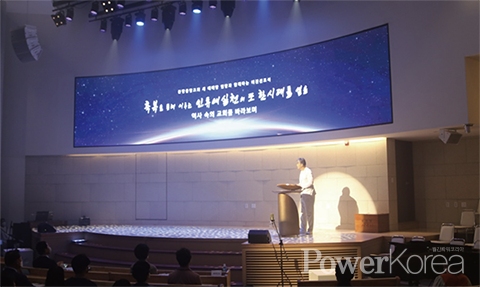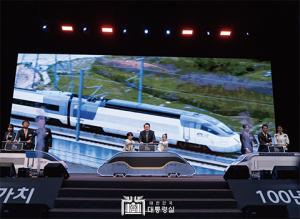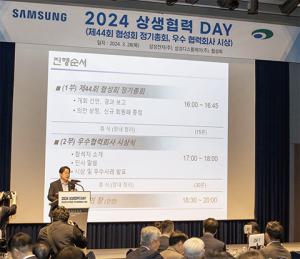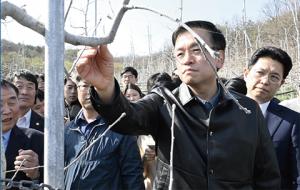 |
||
The Bundang Central Presbyterian Church (Principal Pastor Jeongchun Choi), which has been committed to nurturing human resources with the vision of “a church that changes the world by nurturing people” since its establishment in 1991, is launching the “Korean Theological Series” with a professor from Chongshin University who is a former “Overseas Talent Training Scholar,” the fruit of its pastoral vision and mission. To this end, the church announced plans to hold a research presentation by participating professors at the chapel on September 10, 2023, and to spend a total of 300 million won as part of its humanity practice ministry. For more than a decade, since 1999, the Church has supported two-year doctoral scholars in 6 phases from around the world through Overseas Talent Development, and has had the opportunity to serve more than 100 doctoral students. Among them, there are 65 current professors at universities across the country and 13 at Chongshin University and Graduate School of Theology.
 |
Choi has made contributions to Korean theology built on reformed theology
Supporting a total of 300 million won for humanity, publishing with the highest quality
Aiming to be the ‘compass of the Korean Church’ by covering all areas of theology
The church aims to contribute to history and society by cultivating human resources and to present the right image of the church to Korean society. Thirteen professors at Chongshin University, the seminary of the Presbyterian Church of Korea to which the church belongs, planned to write this ‘Theological Series.’ The book aims to serve as a compass for the Korean church and theological community, covering Old Testament theology, New Testament theology, systematic theology, historical theology, and practical theology. Church’s Principal Pastor Jeongchun Choi says “We practice love for humanity with a ‘faith that makes a hole in the roof’ (Mark 2:4), ‘a mission to fulfill God’s will until the end’ (John 4:34), and a ‘heart that throws bread on the water’ (Je. 11:1). Through our small church, many talented people who will lead the Korean church and the theological community were trained. We have supported the development of each theological field and Christian academics with a long-term perspective, and as a result of our vision and mission, 15 scholars, including professors from Chongshin University who were former overseas talent training scholarship recipients, came together to plan a ‘theological series.’” The church evaluated the written research plans submitted by professors through renowned scholars in each theological field, and finally selected researchers who would participate in the ‘Theological Series’ after a rigorous evaluation based on the National Research Foundation of Korea’s academic paper standards.
Showcasing the church’s contributions to history and society
Researchers will bring up forward-looking alternatives
Researchers plan to complete the writing by the end of 2025, and then plan to compile each work into a theological series and publish it through a publisher which will be followed by numerous seminars and conferences. The significance of this project is that theologians who studied Reformed theology will work together to write a theological series and at the same time achieve academic fruits by writing on the most important topics in their respective fields of study. Choi says “We have dreamed of ‘one person helping a thousand people’ and have always thought about ‘what will remain.’ We seek to change the structures of the Korean church and society through this ‘theological series’ launched with the support of the church. Through this project, we will contribute to the theology and church in Asia and around the world by going beyond dependence on Western theology and further developing Korean theology based on reformed theology.”
[ Interview ]
 |
Host: Publisher of Monthly PowerKorea Jongwon Baek
Panels: Bundang Central Presbyterian Church Principal Pastor Jeongchun Choi and Chongshin University professors Changwook Jeong, Beongho Moon, Heonwoo Shin, Joseph Kim and Heonshin Park
Baek: Bundang Central Presbyterian Church is already well known in Korean Christian circles and abroad as a church that nurtures people to change the world. I’d love to hear what inspired Pastor Choi to focus on talent cultivation.
Choi: There are several visions in the founding of our church. The first is to be conscious of history and society. “Conscious” means “remembering and contributing”. The second was to build people to change the world, meaning to build people in a strategic way to contribute and serve history and society. The third is spiritually healthy people doing the work. We have been doing the same thing for more than 32 years, and until the 6th phase, we have been selecting and supporting people who are in doctoral programs overseas. So there are about 65 people in the country who are full professors or more at universities and colleges, and we thought it would be a good idea for the church to compile their theological work, and that’s how we came to do this. It’s a theological work, but we want to create a work that can empower the church, give a clear opinion to the world, and help people in their thinking. We hope to complete it in 2025.
 |
Baek: I heard that the church has decided to publish a theology book for the first time in Korea, and that 15 theologians, including 13 professors from Chongshin University, have decided to participate in the writing. I would like to ask each of the professors in this conversation what meaning they would like to attach to the publication of the Theological Compendium organized by the Bundang Central Presbyterian Church undang Central Church.
Jeong: Since I first went to study in the United States, I have been thinking a lot about the independence of Korean theology. I think it’s time to move beyond the era of unconditionally following or copying Western theology and into an era of creativity where Korean theology can do something on its own. In order to do that, we need a platform, not just an individual, and I think that’s what the the project does.
Moon: I did my doctoral work on Calvin’s theology and systematic theology of Christ and the law. My interest is in what we call canonical scholarship from the early church to the Reformation or the 17th century. I’m also looking at what systematic theologians are doing now throughout the modern era, which is looking at the whole body of theological texts. We use the word transitional a lot, and I think the church is in a transitional and unique situation right now. Church revitalization is important, but it’s time to think about the fundamental ways the church can serve society and get it right. In our traditional circles, we’ve been marking and criticizing Karl Barth’s theology, and what I’m going to do is I’m going to go through his work thoroughly, and I’m going to look at his Christology, his Trinitarianism, and his revelation, as thoroughly as I can, and I’m going to unfold that.
Shin: I would summarize the project in three ways: to provide a high level of theological work that is needed in our time and for the church in our time, in a short time frame of two and a half years. Scholars are going to write and work on things, but I think it’s meaningful to have a project like this to organize that faith for the church, the kind of faith that is read by the saints, the kind of theology that is very timely for our time, and to do it at a high level and in a short period of time. So I think we’re holding ourselves accountable to write good work.
Kim: Since I’m on the church history side of things, I’ve been thinking a bit about how this project could be historically analogous to the Korean church and theology. The Korean church has been around for a while now, and the days of unilaterally importing things from the West are long gone. On the contrary, foreign churches and theologians want to hear Korean voices, so we thought it was necessary to collect these things and leave them as a resource. I think it’s historically significant in that we can document what kind of voice the department had in the early 21st century on the conservative side of the Korean church and on the Reformed side of the church, and how it taught students and how it tried to help the church.
Park: It’s easier said than done, but it’s not easy to raise up people to change the world. And yet, the church has continued to save us, and we have become professors and scholars, even though our fruit is not enough. In that sense, I think it’s most meaningful that those fruits are now producing other academic fruits. I hope that this will be a sounding board for the Korean church and Korean society to do that kind of work that really builds character. I think theology as an academic discipline has come to mean that the church and the theological community come together to do research for the church, and the church does ministry based on that theology.
 |
Baek: I believe this will be a landmark in the development of Korean theology. What do you expect the publication of the Theological Compendium to accomplish in a nutshell?
Choi: I always think that theology is practical for us, and the reason why theology, the most difficult of difficult disciplines, is practical is because, at the end of the day, we live by thinking. It gives the church direction and purpose, and it gives grace to the congregation, and the congregation gives grace, and it becomes a practical language of life. Theological work is summarized and presented in persuasive words that will impact the lives of the saints and the lives of people.
Moon: This is something that needs to be done, and it hasn’t been done in our Protestantism because we’re so church-centered, but we need people to have a deeper knowledge of the Bible, a deeper doctrinal understanding, and a deeper interest in preaching and the Christian life. We need to look outside the church, not just inside the church, and there are issues of the times that the pastor mentioned. We need an organization to realize this agenda, and we are trying to do that for the first time. The church has done a great job of identifying the talent needed for this, and this project has been 20 years in the making in that sense. As this is the first time something like this has been attempted, I’m sure there will be ripple effects as well as short-term primary results.
Baek: Choi said that the Bundang Central Presbyterian Church, which has always thought about ‘what will remain’, wants to change the structures of the Korean church and society through the publication of a theological compendium, implying that it will further develop a Korean theology based on Reformed theology beyond the dependence on Western theology. In a way, this will lay the foundation for a revolutionary change in Korean theology.
Jeong: When we were in seminary, it was kind of like summarizing a book, and now we’re starting to do a little bit of what we’re coming up with, not just relying on Western theology, and I think it’s a chance to take what we’ve learned and organize it, and show and explore what direction to go in. I think it’s great that we’re pulling together and creating synergy and getting things done in a timeframe.
Choi: I think that history is always transmitted, then inherited and preserved, and then developed. Korea also accepted the gospel and theology at the beginning, but now it has to go to the stage of development. There are many saints in Korea, but there are also many theologians, and now we can see that we are moving to the stage of development through the accumulation of new research and achievements and the publication of these collections.
 |
Baek: The book is scheduled to be completed by the end of 2025. Please tell us about your will and determination as researchers who participated in each work, as well as any future plans or ideas you have.
Kim: I will try to write while thinking about whether I have something to contribute to the Korean church by organizing my field of study. I expect that as we encourage and help each other to produce good works, more diverse and consistent perspectives will emerge. I will do my best.
Shin: First, I feel a responsibility to make this a historic achievement. This is the first time that the church has sponsored a project like this, so I think we have to make it work. Secondly, I feel that when people read this theology, they will be encouraged to live their faith and be inspired to live their faith better. Third, I am determined that the theology should be able to suggest the direction of the church in the future.
Jeong: I want to do a good job so that I can live up to the expectations, but at the same time, I’m anxious about whether I can do a good job. I think these expectations and anxieties synergize with each other, and the conflict creates energy, and this energy allows me to surrender my anxiety to God and think about my responsibilities and take them one step at a time.
Moon: It’s time for the Korean church to give back, and I hope to write this book and publish it in foreign languages so that the world can see how Korean theologians are viewing theology in the early 21st century. I’m so grateful that this has been a wake-up call for me.
Baek: It must be a special feeling for you to be able to provide theological direction to the Korean theological community and the Korean church through the writings of the professors you have supported and collaborated with. Do you have any last words pastor Choi?
Choi: This relationship has been going on for over 20 years. And I’m grateful that that relationship continues, that we’re thinking together, that we’re praying together, that we’re pursuing together, that we’re coming together again for this project. I want to show how theology can indeed empower, provide logic, and give us ground to move forward for the sake of the kingdom of God, and I want to show that it has the most real and practical power as well. What our church does best is follow through. Once they start, they report for 30 years, and I’m grateful that we’re doing something like that again, and I’m grateful for our professors. We think of it as the practice of humanity, so the name of the book will be called ‘Bundang Central Church Theology Practice’. I believe that human practices are a term that the church can use to evangelize people. As it builds, it brings together great theologians under its umbrella, and these are really the most important minds that, when combined, can empower the church and even the world. When they all come together to give a vision to a society, to give them words, sentences, vocabulary that empowers them, that gives them strength, that gives them courage, and that’s really the grace and power of Jesus Christ.
강영훈 kangy423@naver.com







